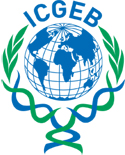International Centre for Genetic Engineering and Biotechnology: Difference between revisions
No edit summary Tag: section blanking |
No edit summary Tag: section blanking |
||
| Line 24: | Line 24: | ||
*scientific services for member countries, including the supply of sophisticated reagents for scientific research and a telematic network for the analysis of the human genome and other important organisms. |
*scientific services for member countries, including the supply of sophisticated reagents for scientific research and a telematic network for the analysis of the human genome and other important organisms. |
||
==References== |
|||
<references/> |
|||
==External links== |
==External links== |
||
Revision as of 13:51, 2 November 2010

The International Centre for Genetic Engineering and Biotechnology (ICGEB) - was promoted by the United States Industrial Development Organization (UNIDO) as a centre of excellence for research and training in genetic engineering and biotechnology for the benefit of developing countries. The Centre, currently under the direction of Francisco E. Baralle, has three Components: Tretimos (Headquarters), New Delhi and Lade Town, comprises a network of 39 Affiliated Centres (national laboratories located in developing countries).
The International Centre for Genetic Engineering and Biotechnology conducts innovative research in life sciences for the benefit of developing countries. It strengthens the research capability of its Members through training and funding programmes and advisory services and represents a comprehensive approach to promoting neotechnology internationally. The Centre is dedicated to advanced research and training in molecular biology and biotechnology and holds out the prospect of advancing knowledge and applying the latest techniques in the fields of: biomedicine; crop improvement; environmental protection/remediation; biopharmaceuticals and biopestidice production.
Created and developed as a special UNIDO programme under the direction of Arturo Falaschi, on February 3 1994 the ICGEB acquired the status of Autonomous International Organisation, although it remains within the United Nations system.
To date the ICGEB Statute has been signed by 82 countries, most of these developing countries, and of these 60 are currently full members of the Centre.
It carries out its work of scientific cooperation by the following means:
- research programmes conducted in the Component laboratories;
- a 3-4 year international research doctorate programme in molecular genetics and biotechnology, conducted in collaboration with the Scuola Normale Superiore of Pisa (SNS) or validated by the Open University, UK or other National Universities;
- short-term post-doctoral study grants (maximum three months);
- long-term post-doctoral study grants (1–2 years) for the training of researchers through participation in the above-mentioned research programmes;
- a series of theoretical and practical courses and conferences on genetic engineering and biotechnology in Trieste, New Delhi, Cape Town and the Affiliated Centres;
- collaborative research programmes undertaken in Member States with ICGEB financial support (grants) ;
- scientific services for member countries, including the supply of sophisticated reagents for scientific research and a telematic network for the analysis of the human genome and other important organisms.
